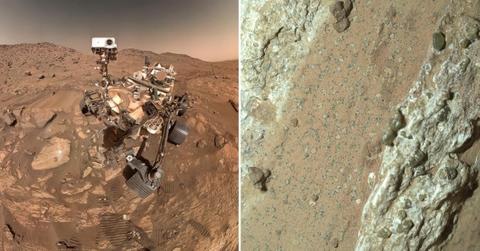Martian Marvel: NASA Mars Rover Discovers Potential Extraterrestrial Microfossils in 'Puzzling, Complex' Rock

NASA’s Perseverance Mars rover took this selfie (left), made up of 62 individual images.; This close-up image of the “Cheyava Falls” Mars rock (right) reveals several intriguing features.
NASA's Perseverance rover has potentially made a groundbreaking discovery on Mars in the form of a rock called "Cheyava Falls."
Located in a dried river valley in the Jezero Crater, this coffee-table-sized rock stands out due to its unusual appearance: reddish and whitish stripes, with dark-rimmed, light-colored spots reminiscent of a leopard's spots.
The red coloration is attributed to the iron mineral hematite, while the white veins consist of calcium sulfate, deposited by water. These features suggest a history of water flow, a critical factor for life, Scientific American reported.
Most intriguing, the rock contains organic compounds, which are carbon-based molecules that are fundamental to life as we know it.
This is a rare and exciting find for Perseverance, which has been exploring Mars since February 2021. The presence of organic compounds, along with the unique "leopard spots," raises the possibility that the rock may have hosted microbial life.
The Perseverance team is particularly interested in the dark rims around the spots, which contain iron phosphate. This compound could potentially serve as an energy source for microbes, much like certain reactions do in Earth's rocks. Such findings suggest that Mars may have once had the right conditions to support life.
To further investigate, Perseverance drilled into the rock and stored a sample for future analysis on Earth. This sample could be part of the Mars Sample Return (MSR) mission, a collaborative effort between NASA and the European Space Agency (ESA). The mission aims to bring back Martian samples for detailed study but faces challenges, including delays and budget constraints.
Ken Farley, Perseverance project scientist at Caltech, described Cheyava Falls as "the most puzzling, complex and potentially important rock yet investigated by Perseverance."
- What Lies Beneath: NASA Scientist Believes Aliens May Have Found 'Perfect' Hiding Spot in Earth's Oceans
- Global Threat: Russia Insider Warns West of 'World War Using Nuclear Weapons' Amid Escalating Support for Ukraine
- Countdown to Disaster? Ex-NATO Official Warns Russia, Iran and China Could Wage WWIII in Just Years
The rock's combination of organic material, signs of water and distinctive spots could point to a history of microbial activity, although its exact origins remain unclear. The team is eager to determine whether these features formed through biological or purely geological processes.
The discovery was made as Perseverance explored Neretva Vallis, a channel that once carried water into the Jezero Crater's ancient lake. The team noticed Cheyava Falls and prioritized collecting data before the rover moved on. While similar rocks have been found nearby, none displayed the same distinctive spots, known as "reduction spheroids," which on Earth can be associated with past life.
Never miss a story — sign up for the Front Page Detectives newsletter. Be on the scene the moment news breaks.
Although Cheyava Falls is not definitive proof of life on Mars, it represents the most promising evidence yet. The MSR mission is crucial for bringing the sample back to Earth, where advanced instruments can conduct a thorough analysis.
Scientists hope to use these tools to determine the age and formation conditions of the rock, as well as to investigate the nature of the organic compounds it contains.
Become a Front Page Detective
Sign up to receive breaking
Front Page Detectives
news and exclusive investigations.
